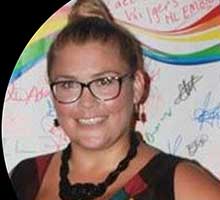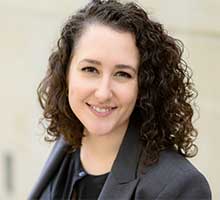Local: LTCF Vaccine Education Program Vital to Chicago’s COVID-19 Outbreak Response Effort
Posted: July 22, 2021
Authors: Shannon Xydis, Projects Administrator, HAI Coordinator, Chicago Department of Public Health; Liz Shane, MPH, CIC. Infection Prevention Specialist, Chicago Department of Public Health, and Christy Zelinski, MPH, Project Manager and Contractor, COVID-19 Response Bureau, Chicago Department of Public Health

Christy Zelinski

Liz Shane

Shannon Xydis
The COVID-19 vaccine roll out in Chicago’s long-term care facilities (LTCFs) was a component of a larger initiative to increase vaccine uptake in the City of Chicago. As the Federal Pharmacy Partnership Program (PPP) was introduced, the Chicago Department of Public Health (CDPH) offered to liaise with LTCFs and facilitate the vaccination process. We were uniquely positioned to assist in LTCFs because of existing relationships with LTCFs after the past year of routine individual facility engagement for COVID-19-related infection control guidance. We worked with the community and leveraged the healthcare facility communication platforms we created to support LTCFs during the pandemic to address vaccine hesitancy and provide vaccine education.
We acted quickly to facilitate vaccination coordination in LTCFs because they were included in the first phase of vaccine distribution due to their residents’ high risk of COVID-19 morbidity and mortality. In partnership with Project Hope, we held two listening sessions with Directors of Nursing, Assistant Directors of Nursing, and Infection Preventionists at LTCFs in Chicago where we assessed their levels of vaccine hesitancy, discussed vaccine hesitancy among residents, and collected ideas on how to increase vaccine uptake. For example, during the listening sessions we heard concerns from communities of color who felt targeted and pressured to get vaccinated and were hesitant about getting it.
We used the information shared and questions asked during the listening sessions to better tailor our vaccine education efforts in LTCFs. These efforts included:
- Converting our weekly COVID-19 LTCF roundtables into a vaccine education and implementation series. During these roundtables, we discussed vaccine hesitancy and encouraged LTCF leaders to empower their staff to become vaccine influencers. We also shared with LTCF leadership concerns we heard from staff and residents and suggested LTCF leaders use the information to adjust their vaccine responses to the needs of residents and staff. For example, we heard that some LTCF staff were hesitant because of how quickly it was being rolled out and concerns about being used as test subjects, so many administrators got the vaccine in front of their staff to show confidence in it. In the early stages of the PPP, representatives from different pharmacies spoke about logistics and provided answers about the vaccination process.
- The CDPH Commissioner hosting a Q&A session for all facilities, which was advertised to all residents and their families.
- Transforming our existing testing strike teams into vaccine mobilization and education teams. The vaccine education teams used the information from the listening sessions to address the concerns of LTCF staff and residents. People viewed the vaccine education teams as trusted sources of information that could speak about the vaccine without outside influences. At one facility, we saw a 40 percent increase in vaccine uptake after one education event. Leadership at the LTCF and the vaccine education team worked together to organize the event.
We kept learning new information as our efforts continued, like the importance of expanding vaccine education initiatives beyond staff and residents at LTCFs. We found that, in many cases, the healthcare power of attorney for residents of LTCFs declined the vaccine on behalf of the residents. Typically, the healthcare powers of attorney do not attend the vaccine education events and miss these opportunities. This gap underscored the importance of empowering family and community members to be vaccine champions.
During the roll out of COVID-19 vaccinations in LTCFs, we continued to appreciate the importance of coordination and planning. Much planning was required to make the vaccine readily available in facilities, particularly second doses. A lot of coordination was also needed to ensure a seamless transition to LTC pharmacies when the PPP ended. Before the PPP ended, we quickly surveyed facilities to identify their LTC pharmacies and encouraged those pharmacies to enroll as COVID-19 vaccine providers. We found that some of Chicago’s LTC pharmacies were located outside of Chicago borders. We could not deliver vaccine to those facilities because the union contracts of our drivers meant they could only drive within the boundaries of Chicago. In order to overcome this roadblock, we partnered with the Illinois Department of Public Health (IDPH) and provided them with doses of Moderna through Tiberius. IDPH then distributed the vaccine to LTC pharmacies that served Chicago facilities, but were based outside of city limits.
The challenges, successes, and experiences supporting COVID-19 vaccine uptake at LTCFs helped us identify strategies to address vaccine hesitancy going forward. Given high staff and resident turnover in LTCFs, it is important to keep high vaccination coverage in LTCFs. It is also important to continue education efforts about vaccines and vaccine hesitancy. We saw that individuals who were hesitant to receive the COVID-19 vaccine may have also been hesitant to get the influenza vaccine. Overall, the educational and coordination strategies we used to address vaccine hesitancy, resources we shared for informed decision making, and methods to increase access of the COVID-19 vaccine in LTCFs will be critical for future vaccine initiatives.
Check out other stories from the Spotlight Series here